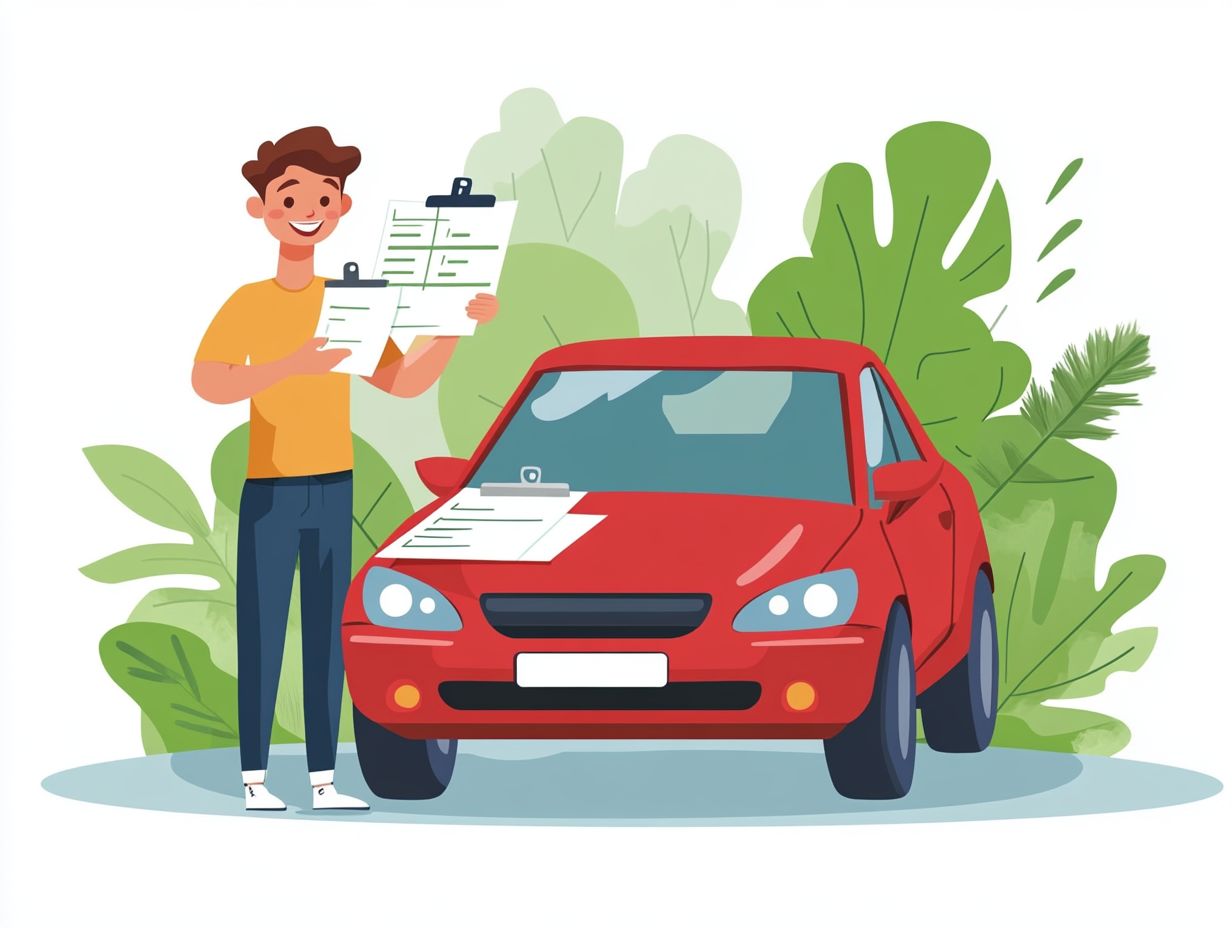How to Prepare for New Car Ownership
Purchasing a new car is an exhilarating journey that requires thoughtful consideration.
From establishing a realistic budget to exploring various financing options, each step plays a pivotal role in guiding you toward an informed decision. Dive into research and compare models that align with your lifestyle, all while paying attention to safety and reliability ratings.
Once you ve pinpointed the perfect vehicle, preparing for ownership covering insurance, registration, and maintenance is crucial. This guide will seamlessly navigate you through every aspect, ensuring you re fully equipped to embrace your new ride.
Contents
- Key Takeaways:
- Preparing for the Purchase of a New Car
- Financing Options for a New Car
- Choosing the Right Car for Your Needs
- Preparing for Ownership and Maintenance
- Frequently Asked Questions
- What are some important steps to take when preparing for new car ownership?
- Should I get a new or used car for my first car ownership?
- What documents do I need to prepare for new car ownership?
- How can I save money when buying a new car?
- What should I do before driving my new car off the lot?
- Do I need to do any maintenance before or after purchasing a new car?
Key Takeaways:

- Set a realistic budget before buying a new car to avoid overspending and financial strain.
- Conduct thorough research and compare different car models to discover the best fit for your needs and preferences.
- Consider your lifestyle and transportation needs when choosing a new car, prioritizing safety and reliability ratings.
Preparing for the Purchase of a New Car
Preparing for the purchase of a new car requires navigating a landscape of financial decisions and research options that will ultimately shape your ownership experience. Begin by establishing a realistic budget and consider tips for first-time new car buyers, factoring in car prices, loan terms, and potential monthly payments.
Evaluate your credit rating and gain a good understanding of dealership financing. Diligently investigate the vehicle’s specifications, essential features, and safety ratings. Use resources like Bankrate, Edmunds.com, and Kelley Blue Book to deepen your consumer insights.
This knowledge will enable you to negotiate a deal that not only meets your expectations but also aligns seamlessly with your financial goals.
Setting a Budget
Setting a budget is essential when you’re in the market for a new car, as it shapes your financial landscape and influences your decisions regarding monthly payments and auto loans.
Understanding total car expenses is also crucial. It goes well beyond the sticker price; it includes insurance costs, maintenance fees, and other recurring ownership expenses that can accumulate more quickly than you might anticipate. By carefully analyzing these factors, you can grasp the overall financial commitment that comes with vehicle ownership, making it vital to consider insurance premiums, which can vary significantly based on vehicle type and your driving profile.
Don’t overlook ongoing maintenance costs, as these can change depending on the car’s age and type. It’s equally important to understand the specifics of any loan amounts and financing options available. For more information on navigating these aspects, check out our guide on how to prepare for a car financing application, ensuring that your monthly payments are manageable and comfortably fit within your budget.
Researching and Comparing Models
Researching and comparing models is an essential step in your car-buying journey. It enables you to make informed decisions about vehicle specifications, safety ratings, and performance.
Utilizing platforms like Edmunds.com and Kelley Blue Book can be incredibly helpful. They offer extensive consumer reviews and detailed vehicle analyses. These resources not only clarify the features each model provides but also enable you to evaluate critical aspects such as safety features and reliability ratings.
By honing in on these elements, you can steer clear of potential pitfalls and ensure that the vehicle you choose aligns with your personal needs and budget. In this way, thorough research becomes an essential ally in navigating the complex landscape of automotive purchases.
Financing Options for a New Car
Understanding the financing options for a new car is crucial for making informed financial decisions that can significantly impact your purchasing power and overall affordability. By looking into dealership financing and bank loans, you ll uncover various loan terms, interest rates, and the notable advantages of securing loan preapproval.
This proactive approach provides you with a considerable advantage in negotiations. Equipped with this knowledge, you gain control during the purchasing process, enabling you to secure the best financing strategy that aligns seamlessly with your budget considerations.
Ready to start your car-buying adventure? Let s dive into the details!
Buying vs. Leasing

The choice between buying a car and leasing one requires careful thought about ownership costs, monthly payments, and long-term financial impacts.
For many, the appeal of ownership is undeniable. Once the vehicle is fully paid off, it s yours to keep. You can drive it as long as you desire without worrying about mileage limits. The potential for resale value can also provide a significant financial advantage; selling a paid-off vehicle can help fund your next purchase.
Leasing often comes with lower monthly payments, giving you the joy of driving a new car every few years. This option typically involves fewer repair costs, as leased vehicles are often covered by warranty. The freedom of having the latest technology and features, without the long-term commitment of ownership, can be remarkably appealing.
Understanding Interest Rates and Loan Terms
Understanding interest rates and loan terms is essential for securing an affordable car loan. They directly impact your monthly payments and overall financial responsibility.
When considering financing options, weigh the benefits of fixed versus variable interest rates. Fixed rates offer stability, ensuring your monthly payments remain constant throughout the loan. In contrast, variable rates can fluctuate based on market conditions, potentially leading to lower initial payments but introducing greater uncertainty down the road.
Securing loan preapproval is crucial. It clarifies the loan amount you qualify for and boosts your negotiating power with dealers. Being informed about how interest rates affect total loan costs enables you to make strategic decisions, ultimately influencing your financial health and control over your personal budget.
Choosing the Right Car for Your Needs
Selecting the perfect car for your needs is a careful process that demands deliberation of vehicle performance, must-have features, and your distinct lifestyle preferences.
Elements like fuel efficiency, safety measures, and anticipated maintenance costs are crucial in shaping your decision.
Whether you lean toward a new model or a pre-owned gem, it’s important to prepare for a car purchase negotiation and understand how these factors impact your daily life for true satisfaction in your car ownership experience.
Considering Your Lifestyle and Transportation Needs
Considering your lifestyle and transportation needs is essential when choosing the right vehicle. It ensures that the car you select aligns perfectly with your daily activities and personal preferences.
Factors such as family size can greatly influence the space and seating configuration you’ll need, especially if you have children or frequently embark on family outings. Your daily commute or trips to regular destinations will influence your desire for fuel efficiency or perhaps even hybrid models, which are cars that use both gasoline and electricity.
If you enjoy weekend road trips or running errands, prioritize features like generous cargo space or cutting-edge safety technology.
Create a comprehensive car checklist to assess your unique circumstances and pinpoint which vehicle specifications will best meet your lifestyle.
Examining Safety and Reliability Ratings
Examining safety and reliability ratings is crucial when choosing a vehicle. These factors significantly influence your peace of mind and long-term satisfaction.
As you research your options, assess various safety features like advanced airbag systems, anti-lock brakes, and electronic stability control. These features improve vehicle safety and shape consumer perceptions of reliability.
Expert reviews often emphasize the importance of crash test ratings from organizations like the IIHS and NHTSA, offering invaluable insights into real-world performance.
By merging detailed safety analyses with firsthand consumer experiences, you can make more informed choices, ultimately leading to a vehicle that aligns with your needs and boosts your sense of security on the road.
Preparing for Ownership and Maintenance

Preparing for car ownership and maintenance requires a clear understanding of not just the initial purchase costs but also the ongoing expenses. Knowing how to prepare for a car purchase budget can significantly influence your financial stability over time.
Important considerations include insurance, registration fees, and the potential advantages of an extended warranty a service that covers repairs beyond the manufacturer’s warranty. All of these play a significant role in your overall ownership costs.
By meticulously evaluating these factors, you can confidently embrace the responsibilities that accompany car ownership while ensuring your vehicle remains in peak condition. Additionally, consider exploring tips for customizing your new car to enhance your driving experience.
Insurance and Registration
Understanding insurance and registration is crucial for effectively managing your ownership costs, as these recurring expenses greatly impact your financial planning.
Different types of insurance coverage like liability, collision, and comprehensive play vital roles in shaping your overall costs. Each type comes with its own unique premiums, influenced by factors such as your age, driving record, and the type of vehicle you own.
Registration costs can fluctuate significantly depending on your region, driven by local taxes and regulations. Analyze these elements carefully, as they significantly contribute to the total expenses of car ownership. This diligence enables you to budget appropriately and make well-informed financial decisions.
Regular Maintenance and Upkeep
Regular maintenance and upkeep are essential for ensuring your vehicle’s performance and reliability over time. By investing in this proactive approach, you can avoid costly repairs and extend the life of your car.
Adhering to a well-structured maintenance schedule allows you to tackle potential issues before they escalate. Routine checks like oil changes, tire rotations, and brake inspections not only optimize your vehicle s performance but also enhance fuel efficiency, leading to significant cost savings.
Implementing preventative measures, such as replacing air filters and monitoring fluid levels, can dramatically reduce wear and tear. Regularly inspecting belts and hoses helps prevent breakdowns, ensuring your vehicle runs smoothly for years to come.
Prioritizing these practices ultimately translates to improved safety and a dependable driving experience.
Frequently Asked Questions
What are some important steps to take when preparing for new car ownership?
- Determine your budget and research different car options that fit within it.
- Decide whether to buy or lease the car.
- Check your credit score and get pre-approved for a car loan if necessary.
- Consider additional costs such as insurance, maintenance, and registration.
- Test drive different car models to find the right one for you.
Should I get a new or used car for my first car ownership?

This depends on your personal preferences and budget. New cars offer the latest features and a warranty but come with a higher price tag. Used cars may be more affordable but may come with unknown maintenance or repair issues. Do your research and consider all factors before making a decision.
What documents do I need to prepare for new car ownership?
You will need a valid driver’s license, proof of insurance, and registration documents from the dealership or previous owner. You may also need to provide proof of income and a down payment if financing the car.
How can I save money when buying a new car?
Consider negotiating the price with the dealership, looking for rebates or discounts, or buying during a sale or promotion. You may also be able to save money by purchasing a car with good fuel efficiency or opting for a lower trim level with fewer features.
What should I do before driving my new car off the lot?
Make sure all necessary paperwork is completed, including transferring ownership and registering the car. Familiarize yourself with the car’s features and settings, and take a final test drive to ensure everything is in working order. For a comprehensive overview, check out what to expect when buying a new car.
Don’t wait! Start budgeting today and get ready to embrace the joys of car ownership!
Do I need to do any maintenance before or after purchasing a new car?
It’s always smart to have your potential car checked by a mechanic, especially if it’s used. This can help you avoid costly surprises later.
After buying, follow the car maker’s maintenance schedule for oil changes, tire rotations, and other essential upkeep. Using the essential maintenance checklist for new cars can help you stay on top of these tasks, keeping your car running smoothly and safely!






